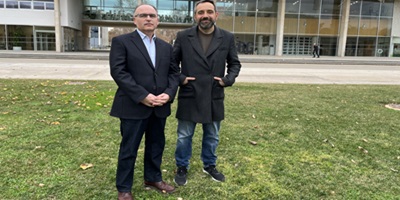Who can “Test. Test. Test.”?
Researchers from INGENIO, a joint center of the Consejo Superior de Investigaciones Científicas (CSIC) and the Universitat Politècnica de València (UPV), have recently published, together with two co-authors from the University of Sussex (UK), the results of a study on the organization of the laboratory network to perform Covid-19 PCR testing during the Covid-19 pandemic in Spain and the UK and its subsequent implications.
The work shows how the criteria of medical professionals in Spain (in this case clinical microbiologists in public hospitals) were more influential in the organization of testing laboratories than in the United Kingdom. In the latter country, criteria related to efficiency were imposed, with experts having less influence over decisions on testing activities. These conditions led to creation of new centralized mega-laboratories - the so-called ‘Lighthouse Labs’, which were criticised for their high cost and low quality of testing.
"The consequences of these decisions have been very different in the two countries: while in Spain the influence of microbiologists helped public hospital laboratories to be more prepared today than before the pandemic, in the United Kingdom the large centralized laboratories that were built during the crisis have been dismantled and it seems that they have not helped to improve the country's capabilities", points out David Barberá, researcher at INGENIO and one of the authors of the study.
The study is based on 44 interviews conducted with expert personnel from both countries, from heads of laboratories to health policy makers or public health specialists in both countries, in addition to the analysis of multiple documents.
"Our analysis focuses on the discourses and practices used in the two countries that we conceptualize as "boundary work", i.e., discourses and practices aimed at excluding from the system laboratories that had PCR technology but did not meet the criteria set by the logic of medical professionals (in Spain) or the logic of efficiency (in the United Kingdom)," explains Enrique Meseguer, INGENIO researcher and co-author of the study.
Thus, the study highlights that while in the United Kingdom the established publicly funded clinical laboratories were limited in their testing volumes, in favour of Lighthouse Labs, in Spain university or research laboratories were de facto excluded.
This work is part of the OCTS (Optimising Coronavirus Testing Systems) research project led by the University of Sussex and funded by UKRI (United Kingdom Research & Innovation), the British government funding agency. The project has studied the organization of the testing system in eight countries during the Covid-19 crisis (United Kingdom, Spain, Germany, South Korea, South Africa, Ireland, Australia and Canada). An interdisciplinary team, composed of specialists in innovation in medicine, health emergencies or epidemiology, met weekly during the period June 2020 to May 2022 to discuss different aspects of pandemic testing systems in the countries studied. Investigations have been carried out on issues such as the relationship between testing system capacity and excess mortality in all countries studied, or the organization of testing for international travel. This comparative work focused on Spain and the United Kingdom is the first article published as a result of the research project.
Reference
David Barberá-Tomás, James Bates, Enrique Meseguer & Michael M. Hopkins (2023) Who ca “Test. Test. Test.”? The interplay between boundary work and institutions in the organisation of diagnostic testing for COVID-19, Innovation, DOI: 10.1080/14479338.2023.2254740




